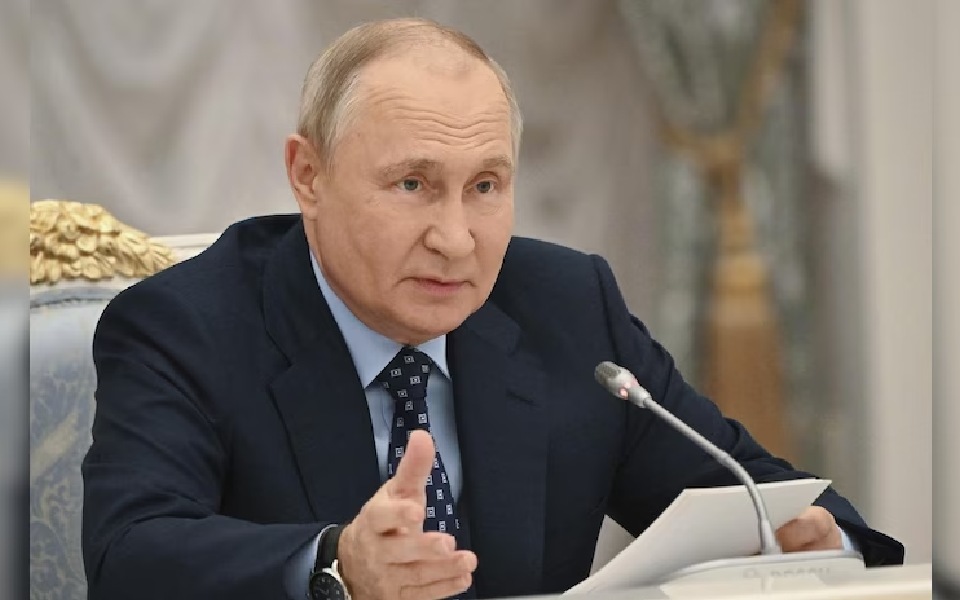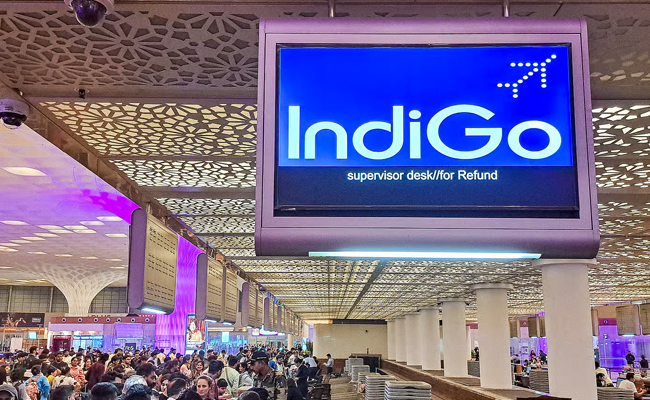Moscow, Apr 19 (AP): Russian President Vladimir Putin announced a temporary Easter ceasefire in Ukraine starting Saturday, citing humanitarian reasons, as Russia and Ukraine swapped hundreds of captured soldiers in the largest exchange since Moscow's full-scale invasion started over three years ago.
According to the Kremlin, the ceasefire will last from 6 pm Moscow time (1500 GMT) on Saturday to midnight (2100 GMT) following Easter Sunday.
“We assume that the Ukrainian side will follow our example. At the same time, our troops must be ready to repel possible violations of the truce and provocations from the enemy, any of its aggressive actions,” Putin said at a meeting with Chief of the General Staff Valery Gerasimov, in a video shared by the Kremlin's Press Service.
Ukrainian President Volodymyr Zelenskyy called the ceasefire “another attempt by Putin to play with human lives.” He wrote on X that “air raid alerts are spreading across Ukraine,” and “Shahed drones in our skies reveal Putin's true attitude toward Easter and toward human life”.
Largest POW exchange so far
The two sides meanwhile exchanged hundreds of POWs on Saturday. Russia's Ministry of Defence said that 246 Russian service members were returned from territory controlled by Kyiv, and that “as a gesture of goodwill” 31 wounded Ukrainian POWs were transferred in exchange for 15 wounded Russian soldiers in need of urgent medical care.
Zelenskyy said that 277 Ukrainian “warriors" have returned home from Russian captivity.
Both sides thanked the United Arab Emirates for their mediation.
Putin's ceasefire announcement came after US President Donald Trump on Friday said negotiations between Ukraine and Russia are “coming to a head” and insisted that neither side is “playing” him in his push to end the grinding three-year war.
Trump spoke shortly after Secretary of State Marco Rubio warned that the US may “move on” from trying to secure a Russia-Ukraine peace deal if there is no progress in the coming days, after months of efforts have failed to bring an end to the fighting.
In January 2023, Putin had ordered his forces in Ukraine to observe a unilateral, 36-hour cease-fire for Orthodox Christmas. Ukrainian President Volodymyr Zelenskyy had stopped short of stating his forces would reject Putin's request, but dismissed the Russian move as playing for time to regroup its invasion forces and prepare additional attacks.
Russia says its forces have retaken nearly all of Kursk
Russia's Defence Ministry said Saturday its forces pushed Ukrainian troops from the village of Oleshnya, one of their last remaining footholds in Russia's Kursk region where the Ukrainians staged a surprise incursion last year.
Gerasimov said Saturday in a report to Putin, quoted by Russian state media, that Russia had retaken nearly all of the territory from Ukrainian forces.
“The main part of the region's territory, where the invasion took place, has now been liberated. This is 1,260 square kilometers, 99.5%,” Gerasimov said.
Zelenskyy wrote on X that Ukrainian forces “continued their activity on the territory of the Kursk region and are holding their positions”.
The Associated Press was unable to immediately verify the claim by Russia. Russian and North Korean soldiers have nearly deprived Kyiv of a key bargaining chip by retaking most of the region.
According to Russian state news agency Tass, Russia is still fighting to push Ukrainian forces out of the village of Gornal, some 11 km south of Oleshnya.
“The Russian military has yet to push the Ukrainian armed forces out of Gornal... in order to completely liberate the Kursk region. Fierce fighting is underway in the settlement,” the agency reported, citing Russia security agencies.
In other developments, the Ukrainian air force reported that Russia fired 87 exploding drones and decoys in the latest wave of attacks overnight into Saturday. It said 33 of them were intercepted and another 36 were lost, likely having been electronically jammed.
Russian attacks damaged farms in the Odesa region and sparked fires in the Sumy region overnight, Ukraine's State Emergency Service said Saturday. Fires were contained, and no casualties were reported.
Russia's Ministry of Defence, meanwhile, said its air defence systems shot down two Ukrainian drones overnight into Saturday.
Let the Truth be known. If you read VB and like VB, please be a VB Supporter and Help us deliver the Truth to one and all.
Bengaluru (PTI): The Karnataka government has issued directions to municipal corporations across the state to regulate and prohibit feeding pigeons in public places, citing serious public health concerns.
Deputy Secretary to Government V Lakshmikanth has written to the Urban Development Department requesting it to issue directions to the Greater Bengaluru Authority (GBA) and all municipal corporations to take immediate steps to implement the measures.
In an official note dated December 16 issued by the Health and Family Welfare Department and released to the media on Wednesday, the department said uncontrolled feeding of pigeons in public places has resulted in large congregations of birds, excessive droppings and serious health concerns, particularly respiratory illnesses linked to prolonged exposure to pigeon droppings and feathers such as hypersensitivity pneumonitis and other lung diseases.
ALSO READ: Chinese GPS tracker found on seagull near Karwar Coast
"The commissioner, the Greater Bengaluru Authority and the Commissioners and chief officers of other municipal corporations shall take necessary action to mitigate the causes of dangerous disease spread by pigeon and enforce specified guidelines in their respective jurisdiction," the note said.
According to the department, these include a prohibition on feeding pigeons or causing pigeons to be fed in areas where it may cause nuisance or pose a health hazard to the public. Pigeon feeding shall be permitted only in designated areas in a controlled manner, subject to certain conditions.
"The designated areas may be selected in consultation with stakeholders. The responsibility for upkeep of the designated areas and compliance to the directions shall be taken up by some charitable organisation or an NGO. The feeding in designated areas shall be permitted only for some limited hours in the day," it said.
The note further stated that authorised officers of local authorities shall issue on-the-spot warnings and may impose fines for violation of the order, or lodge complaints to prosecute offenders under Sections 271 (Negligent act likely to spread infection of disease dangerous to life) and 272 (Malignant act likely to spread infection of disease dangerous to life) of the Bharatiya Nyaya Sanhita.
It also directed local authorities to conduct public awareness campaigns, including the display of signboards, banners and digital messages, explaining the health hazards associated with pigeon droppings and feathers, the content of the regulatory directions and penalties for violations, and alternative humane methods of bird conservation that do not endanger public health.





